Congratulations to Katherine (Katie) Deck, a graduate student in Dr. Mu’s lab, who has been awarded a highly competitive two-year NIH Predoctoral Fellowship grant. Katie’s research project, titled “Kidney-resident memory CD8+ T cells promote hypertension and memorize salt-sensitivity,” seeks to uncover critical mechanisms by which kidney-resident memory CD8T cells contribute to hypertension and the phenomenon of ‘salt memory,’ which drives the progression and recurrence of hypertension. Katie, who has already received fellowship funding from the American Heart Association (AHA), is now also recognized by the NIH with a grant totaling $77,890. This funding will support her stipends and research-related expenses for the next two years. Associate Professor Dr. Shengyu Mu is serving as Katie’s mentor and sponsor. Collaborators contributing to this award include Assistant Professor Dr. Yunmeng Liu, Associate Professor Dr. Yuet-Kin (Ricky) Leung from the Department of Pharmacology and Toxicology, Assistant Professor Dr. Lu Huang, and Associate Professor Dr. Lin-Xi Li from the Department of Microbiology and Immunology.
College of Medicine
“Sweethearts” Learn about Heart Health, Cardiovascular Research at UAMS
UAMS Website

Faculty and lab teams from the departments of Pharmacology and Toxicology and Neurobiology and Developmental Sciences in the College of Medicine and Pharmaceutical Sciences in the College of Pharmacy hosted 30 “sweethearts” — high school sophomore and junior girls participating in the American Heart Association and AHA Arkansas Chapter “Sweethearts” program — on two evenings in January.
Nancy Rusch, Ph.D., Distinguished Professor and Chair of the Department of Pharmacology and Toxicology, organized the event and welcomed each evening’s participants during an introductory session. Groups of “sweethearts” then rotated through five laboratories to learn about cardiovascular health and cardiovascular research at UAMS.
Conducted over several months, the AHA program focuses on heart healthy lifestyles, prevention of heart disease and volunteer work.
Participating laboratories and faculty included:
- Abdelrahman Fouda, Ph.D., Assistant Professor of Pharmacology and Toxicology, who discussed treatments for stroke and retinal diseases.
- Yunmeng Liu, Ph.D., Assistant Professor of Pharmacology and Toxicology, who along with trainees in the lab of Associate Professor Shengyu Mu, Ph.D., demonstrated blood pressure measurement and discussed salt-sensitive hypertension.
- Nirmala Parajuli, DVM, Ph.D., Assistant Professor of Pharmacology and Toxicology, and staff, who discussed the team’s research to improve renal transplant outcomes.
- Kevin Phelan, Ph.D., Professor of Neurobiology and Developmental Sciences, who demonstrated cardiovascular ultrasound imaging with hands-on opportunities for students to image the heart.
- Amanda Stolarz, PharmD, Ph.D., Assistant Professor of Pharmaceutical Sciences, who introduced the students to the lymphatic circulation and discussed her lab team’s efforts to find a treatment for lymphedema.
Kudos from the AHA Arkansas Chapter and Dr. Rusch to the many department administrators, faculty and trainees who contributed to this year’s event.
UAMS Researcher Receives $1.8 Million NIH Grant to Study Key Cell Processes in Energy Production
By David Robinson
Dec. 5, 2023 | LITTLE ROCK — Huiliang Zhang, Ph.D., at the University of Arkansas for Medical Sciences (UAMS), will use a $1.8 million grant from the National Institutes of Health (NIH) to study proton leak, a process within the body that affects metabolism and energy.
Although scientists have been aware of proton leak for decades, Zhang said, little is known about its underlying causes, how prevalent it is across organ systems, and whether it has benefits or harms.
Proton leak is like a tiny leak in a cell’s energy system. There is a proton gradient across the mitochondrial inner membrane. Energy is made when protons move a certain way across a cell’s mitochondrial inner membrane. However, there can be a small portion of protons crossing the mitochondrial inner membrane that are unable to produce energy. This is called proton leak.
Zhang is an assistant professor in the College of Medicine Department of Pharmacology and Toxicology. His research has previously focused on the heart, but the five-year award from the NIH National Institute of General Medical Sciences (NIGMS) will allow him to broaden his scope. Using a new fluorescence test that he developed, Zhang will measure proton leak levels in the cells of different organs and determine the molecular mechanisms responsible for proton leak.
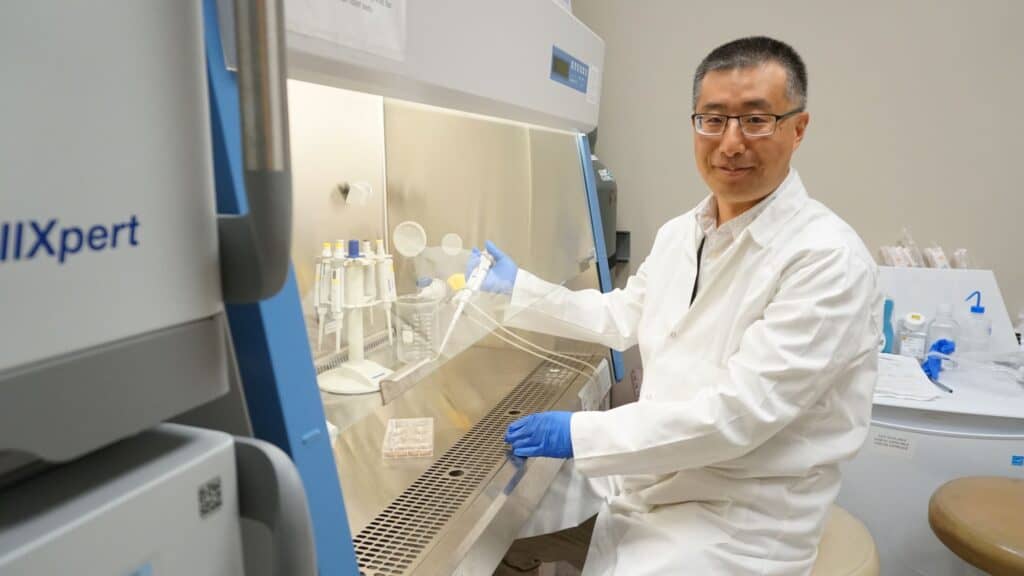
His findings will inform his next effort to find potential drug targets that can either increase or decrease the levels of proton leak.
For example, he said, chronic, excessive proton leak in the high energy-demanding heart muscle would make it weaker, which would call for a drug that could reduce proton leak.
“For some cases that mitochondria are not working efficiently, maybe we need some proton leak blockers to make proton leak less,” he said.
On the other hand, increasing proton leak in some tissues might be beneficial, for example, for someone trying to lose weight.
“When the proton leak is elevated, the mitochondria need to work much harder to produce energy, which increases metabolism,” he said. “This could be beneficial to someone struggling to lose weight.”
UAMS’ Andrew Morris, Ph.D., Recognized with Prestigious VA Research Career Scientist Award
By David Robinson
Aug. 21, 2023 | UAMS and Veterans Affairs (VA) researcher Andrew Morris, Ph.D., has received the prestigious Research Career Scientist Award from the VA Office of Research and Development. The designation is for established researchers who have distinguished themselves through scientific achievements and substantial contributions to the VA research community.
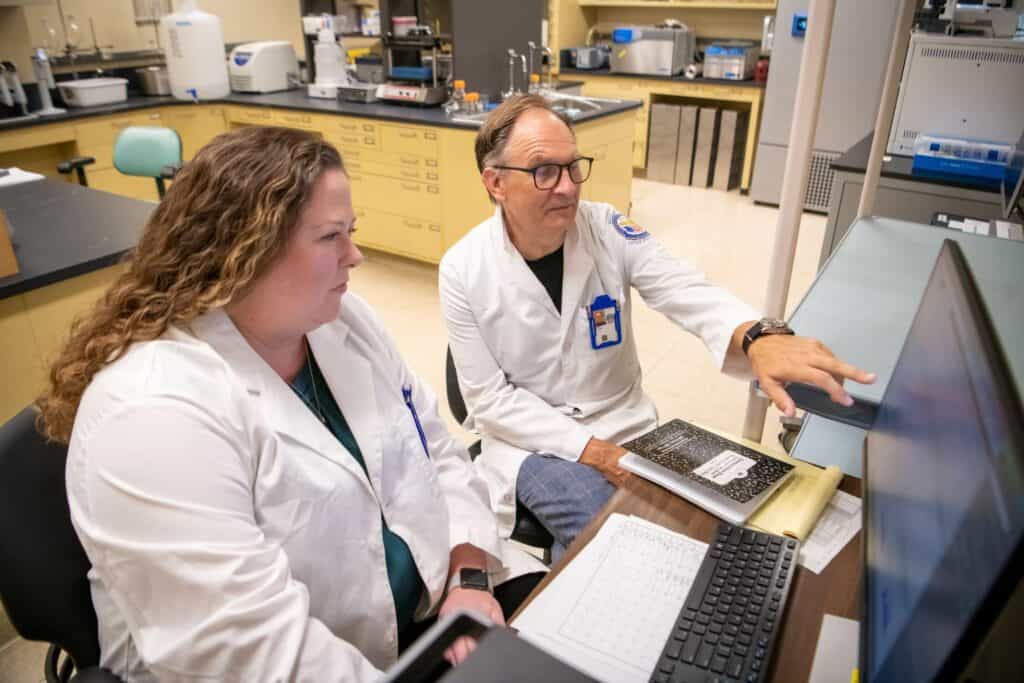
Morris is the UAMS Mehta/Stebbins Chair in Cardiovascular Research and a professor in the College of Medicine Department of Pharmacology and Toxicology.
“I am deeply honored to receive the VA’s Research Career Scientist Award,” said Morris, who has been recognized for ranking among the top 2% of most influential researchers. “This recognition is a reflection of the hard work of my dedicated and talented research team and the unwavering support and collaboration of my esteemed colleagues and mentors.”
Morris has been funded by the VA since 2007, both individually and with his wife, the late Susan Smyth, M.D., former College of Medicine dean, for studies of lipid metabolism and signaling in vascular inflammation and thrombosis. Morris developed and now directs an analytical laboratory at the Central Arkansas Veterans Healthcare System (CAVHS) that provides biomonitoring services to support health research studies of veterans and active-duty military personnel. A current focus is on per- and polyfluorinated substances, which are pervasive, manmade surfactant chemicals with toxic effects.
Shuk Mei-Ho, Ph.D., UAMS vice chancellor for Research and Innovation, said the award underscores the vital research alliance between UAMS and the VA.
“Our partnership with CAVHS has enabled talented UAMS faculty like Dr. Morris to deliver meaningful, high-quality research to the benefit of Arkansas and beyond,” Ho said.
Recipients of the Research Career Scientist Award are selected through a competitive peer review process. Morris’ award totals $750,000 and will provide him with five years of additional salary support. His work is also funded by grants from the VA, National Institutes of Health and Department of Defense, which support the six members of his research team.
Ho noted that while the honor typically goes to researchers at larger VA-affiliated universities, multiple UAMS faculty, including herself, are recipients.
Other UAMS awardees include Teresita Bellido, Ph.D., professor and chair of the Department of Physiology and Cell Biology; and Alexei Basnakian, M.D., Ph.D., a professor in the Department of Pharmacology and Toxicology. Robert J. Reis, Ph.D., a professor in the Department of Geriatrics, received the VA’s Senior Research Career Scientist Award, which provides seven years of funding.
UAMS Invests Andrew J. Morris, Ph.D., in Mehta/Stebbins Chair in Cardiovascular Research
By Andrew Vogler
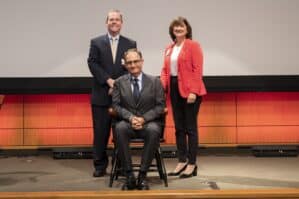
Nov. 16, 2022 | LITTLE ROCK — The University of Arkansas for Medical Sciences (UAMS) College of Medicine invested Andrew J. Morris, Ph.D., professor in the Department of Pharmacology and Toxicology, in the Mehta/Stebbins Chair in Cardiovascular Research during a Nov. 9 ceremony.
“I am honored to have this chair, and as I learn more about UAMS, I am grateful for the opportunity to be part of its community and to contribute to its history,” said Morris. “I’ve been an independent researcher for almost 30 years, and I am lucky in that I’ve had a very rewarding career.”
Morris also serves as a research investigator at the Central Arkansas Veterans Healthcare System. His work is related to understanding interactions between genetic, behavioral and environmental risk factors for non-communicable diseases using multidisciplinary approaches that combine biochemical, molecular genetic and cell biological methods with preclinical models and population health studies.
An endowed chair is among the highest academic honors a university can bestow on a faculty member. An endowed chair is established with gifts of at least $1 million, which are invested, and the interest proceeds used to support the educational, research and clinical activities of the chair holder. Those named to a chair are among the most highly regarded scientists, physicians and professors in their fields.
“The forged medallion that Dr. Morris will receive today represents the work that has been done and the great work that he will conduct,” said Cam Patterson, M.D., MBA, UAMS chancellor and CEO of UAMS Health. “I have known Andrew for a very long time, and I couldn’t be prouder to be on this stage to celebrate this honor with him.”
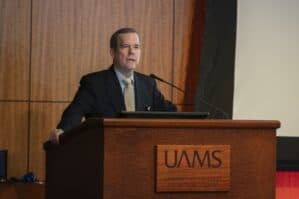
The chair was established in 2011 by a gift from the estate of the late Howard and Elsie Stebbins to help fund their longtime vision of a cardiovascular research chair at UAMS.
“The Mehta/Stebbins Chair in Cardiovascular Research is the second endowed chair at UAMS made possible thanks to the late Howard and Elsie Stebbins,” said Stephanie Gardner, Pharm. D., Ed.D., UAMS provost and chief strategy officer. “The Stebbins family, whose primary philanthropic interest has been related to cardiology, began their generous relationship in 1993. Dr. Jay Mehta, whose family was close friends of the Stebbins, was the inaugural holder of the chair.”
Morris was born in Hampstead, England. He obtained a First-Class Honors degree in biochemistry from the University of Bristol. He completed post-doctoral training at the University of Birmingham with Sir Peter Downes and Bob Michell. He was a post-doctoral Fellow and research faculty member at the University of North Carolina at Chapel Hill and held tenured faculty positions at Stony Brook University in Stony Brook, New York, the University of North Carolina-Chapel Hill and the University of Kentucky in Lexington, where he worked for 16 years as an endowed professor. He joined UAMS in the fall of 2021.
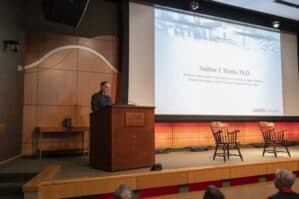
Morris’s laboratory has made important contributions to the identification of genes involved in intracellular lipid metabolism and signaling. He now directs an analytical laboratory at the Central Arkansas Veterans Healthcare System that provides biomonitoring services to support population health research, including studies of veterans and active-duty military personnel enrolled in the Millennium Cohort in the Million Veteran Program. Morris’s research primarily is supported by grants from the Veterans Health Administration, National Institutes of Health and the U.S. Department of Defense. He has authored almost 300 peer-reviewed research articles, and a recent report placed him in the top 2% of highly cited researchers in the biomedical sciences.
“UAMS is very fortunate to have recruited Dr. Morris from the University of Kentucky — his research accomplishments, interests and activities are well aligned with Arkansas and the university,” said Linda S. Birnbaum, Ph.D., director of the Department of Environment Sciences and Engineering at the University of North Carolina. “He is very deserving of the recognition provided by the Mehta/Stebbins Chair, and I am looking forward to following his research contributions.”UAMS is the state’s only health sciences university, with colleges of Medicine, Nursing, Pharmacy, Health Professions and Public Health; a graduate school; a hospital; a main campus in Little Rock; a Northwest Arkansas regional campus in Fayetteville; a statewide network of regional campuses; and seven institutes: the Winthrop P. Rockefeller Cancer Institute, Jackson T. Stephens Spine & Neurosciences Institute, Harvey & Bernice Jones Eye Institute, Psychiatric Research Institute, Donald W. Reynolds Institute on Aging, Translational Research Institute and Institute for Digital Health & Innovation. UAMS includes UAMS Health, a statewide health system that encompasses all of UAMS’ clinical enterprise. UAMS is the only adult Level 1 trauma center in the state. UAMS has 3,240 students, 913 medical residents and fellows, and five dental residents. It is the state’s largest public employer with more than 11,000 employees, including 1,200 physicians who provide care to patients at UAMS, its regional campuses, Arkansas Children’s, the VA Medical Center and Baptist Health. Visit www.uams.edu or uamshealth.com. Find us on Facebook, Twitter, YouTube or Instagram.
###
Pharm Tox Weekly Buzz October 10 – 14, 2022
Basnakian Team Publishes Collaborative Manuscript
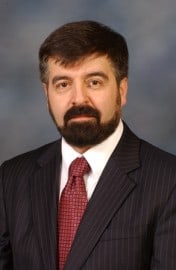
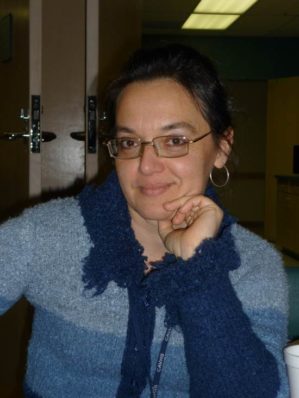
Professor Alexei Basnakian and former research associate Alena Savenka published a manuscript in the journal Antioxidants. The article titled “Effects of gamma-tocotrienol on partial-body irradiation-induced intestinal injury in a nonhuman primate model” is a collaborative study with investigators from the Winthrop P. Rockefeller Cancer Institute, which includes retired professor Martin Hauer- Jensen, assistant professor Isabelle Miousse, assistant research professor Tarun Garg, and assistant staff scientist Sarita Garg, as well as scientists from the Uniformed Services University of Health Sciences in Bethesda, Maryland. The study evaluated the vitamin E analog gamma-tocotrienol (GT3) as a radio- protector and determined its ability to accelerate GI recovery in partial-body irradiated (PBI) nonhuman primates subjected to X-rays. The data relied on the TUNEL assay and im- munostaining of Ki67 and other markers of cell injury and recovery to suggest that X-rays induce severe intestinal injury post-PBI and GT3 confers a short-term radioprotective effect.
Dr. Julia Tobacyk Wins Second Place in People’s Choice Award
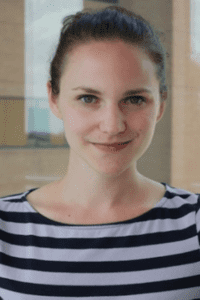
Postdoctoral fellow Julia Tobacyk and postdoctoral fellow Megan Reed (Biochemistry and Molecular Biology) won second place in the People’s Choice Award at a recent Seed Funding Pitch Competition at the Sam M. Walton College of Business at UA Fayetteville. Dr. Tobacyk and her team, which includes two other graduate students from the UA Fayetteville, won $1000 for their project, “A diagnostic tool for treating glioblastoma using precision medicine”. The competition was part of the New Venture Development course that Dr. Tobacyk is enrolled in as a scholar in the CTSA-funded Health Sciences Innovation and Entrepreneurship Postdoctoral Training Program. Way to go Dr. Tobacyk!
Dr. Fantegrossi Wins First Place in Lightweight Masters Division
Associate professor Bill Fantegrossi recently took first place in the New Orleans Strength Expo Battle on the Bayou in the Lightweight Masters Division. Congratulations Dr. Fantegrossi!


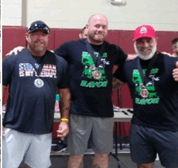
Drs. Prather and MacMillan-Crow Receive Barton Award
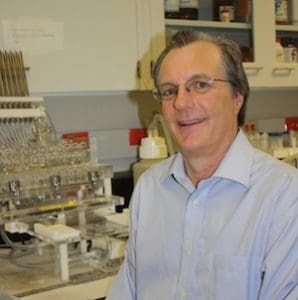
Professors Lee Ann MacMillan-Crow and Paul Prather are the recipients of a Barton Pilot Award. “Characterization of synthetic cannabinoid-induced mitochondrial dysfunction leading to renal injury” is funded for $25,000 for one year beginning January 1, 2021. K2” and “Spice” are products sold as “synthetic marijuana”; however, contain dangerous synthetic cannabinoids (SCBs).
In addition to producing a variety of toxic effects, SCBs induce acute kidney injury (AKI) via unknown mechanisms. The studies funded by this award will test the hypothesis that SCBs induce renal mitochondrial dysfunction via mechanisms involving Cannabinoid Type 1 (CB1) receptor-mediated induction of reactive oxygen species (ROS).
Dr. Parajuli Receives Barton Pilot Award

Congratulations to assistant professor Nirmala Parajuli on receiving a Barton Pilot Award! The project, “The role of Hsp72 chaperone in monocyte-derived macrophage activation and renal graft failure” is a one-year award which begins January 1, 2021. The project will test the hypothesis that renal cold storage induces CCL2 and Hsp72 in renal allografts, which promotes monocyte-derived macrophage infiltration and activation as a mechanism of graft injury. The award amount is $25,000.
Dr. Paul Prather Named Vice-Chair of Department
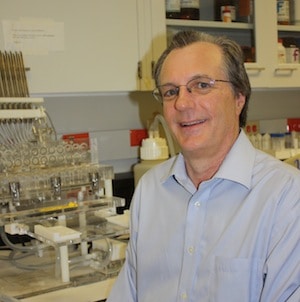
Professor Paul Prather has been named Vice Chair of the department! Dr. Prather was selected based upon his proven leadership abilities as evident by his directorship of the T32 Systems Pharmacology and Toxicology (SPaT) training program; his service as chair of the department promotion and tenure committee and the faculty search committee; his new position as director of the Pharmacology, Toxicology and Experimental Therapeutics graduate track; and his coordination of subprojects within his R01 grant, which is the single largest NIH award in the department. Additionally, he has acted as a role model for everyone by juggling all his duties capably and calmly during the COVID-19 pandemic. Thanks Dr. Prather for agreeing to serve the department in an expanded leadership role!
Dr. MacMillan-Crow Appointed GPIBS Track Director

Professor Lee Ann MacMillan Crow will begin serving as the GPIBS Track Director, effective December 1. She will become the contact person for the program and chair the GPIBS Advisory and Admission Committees, and work with the track directors as we continue to move this exceptional program forward. Dr. MacMillan Crow has served on countless dissertation/thesis committees and served as a major advisor to many Ph.D. students. She has served as graduate program director for the former Interdisciplinary Toxicology program and since the start of GPIBS has served as the track director for the Pharmacology, Toxicology, and Experimental Therapeutics (PTET) track. Professor Paul Prather will take over as the PTET Track Director. Dr. Prather has been involved with graduate education throughout his career here as well. He is currently the PI on the highly interdisciplinary SPaT T32 NIH training grant.
